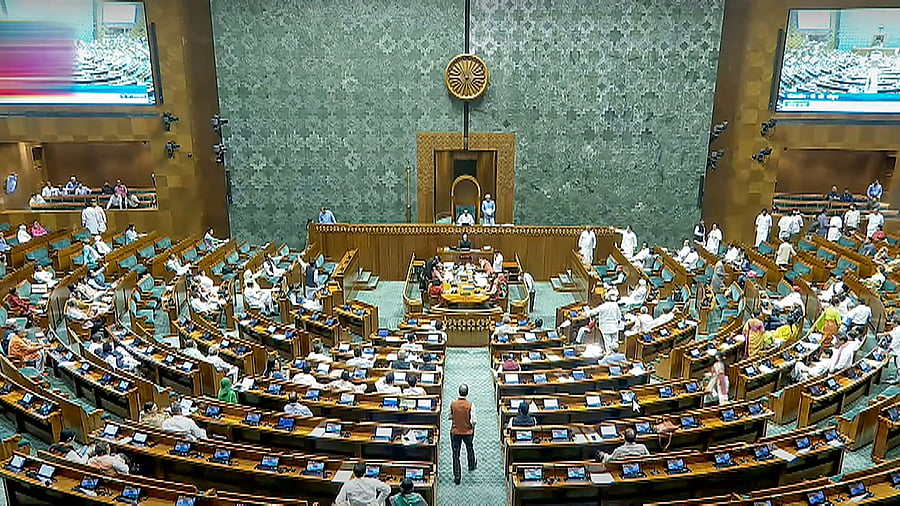
Members in the Lok Sabha in the Parliament, in New Delhi.
Credit: PTI File Photo
New Delhi: At a time Tamil Nadu is in confrontation with the union government over its refusal to implement the National Education Policy (NEP) owing to its opposition to the three-language formula, a Parliamentary panel has said that there is no justification for stalling funds to the state as well as to Kerala and West Bengal for not accepting NEP or PM SHRI schools scheme.
The Parliamentary Standing Committee on Education, Women, Children, Youth and Sports headed by senior Congress MP Digvijaya Singh recommended immediate release of pending Samagra Siksha Abhiyan funds to states like Kerala, Tamil Nadu and West Bengal to prevent disruption in salaries, teachers training programs, and school infrastructure maintenance.
The total funds under SSA pending for Tamil Nadu is Rs 2,152 crore while for Kerala, it is Rs 859.63 crore and over Rs 1,000 crore for West Bengal, the report on Demands for Grants for the Department of School Education in the Ministry of Education said.
Tamil Nadu had refused to implement the PM SHRI scheme as it is opposed to the NEP 2020 that insists on a three-language formula. Kerala and West Bengal also have not signed the MoU with the Ministry of Education for its implementation.
The Department of School Education has told the committee that PM SHRI is the model school scheme developed under the NEP and the SSA is the programme to achieve the NEP goals.
"This appears to be the reasoning behind the decision to halt SSA grants to states not signing the PM SHRI MoU. However, the Committee takes the view that this reasoning is not factual or justified. The SSA predates PM SHRI and is intended to help states to achieve the targets of the Right to Education Act," it said.
Taking serious note of the non-release of SSA funds to the three states, the report said the Right to Education is a law passed by Parliament and confers education as a fundamental right onto every child. The SSA, as a scheme that enforces the fundamental right-based RTE, cannot be bypassed by the NEP, which is an executive policy statement, it said.
Observing that Kerala, Tamil Nadu and West Bengal have demonstrated strong educational outcomes with a Gross Enrollment Ratio (GER) significantly above the national average, the report said that underfunding and delays in transfer of SSA funds, however, have constrained further advancements in their school infrastructure, teacher training, and student support.
"These States have been compelled to use their own funds to pay salaries to teachers and resource personnel due to delays in release of central allocations. During 2024-25, states like Tamil Nadu were allocated Rs 3,586 crores under SSA, with the union government's share expected to contribute Rs 2,152 crore, but this amount has not been released despite repeated requests by the state government," it said.
"The withholding of funds is severely impacting teachers’ salaries, RTE reimbursements, and transportation for students in remote areas. The Committee further observes that withholding the funds under SSA to States for not entering into MoU for separate schemes like PM SHRI is not justifiable," it said.
